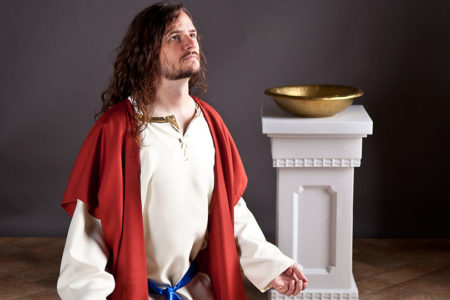Counseling the Christian Hebrews 13:7–17
Chapter 13 of Hebrews contains the book’s final admonishment. Whereas verses 1–6 provide practical and personal exhortation on how believers should live in Christ, verses 7–17 focus more on theological issues and the gospel.
The Believer’s Consistency
Verse 7 exhorts readers to recall the ministries and conduct of their past leaders: “Remember those who rule over [lead] you, who have spoken the word of God to you, whose faith follow, considering the outcome of their conduct.”
The word remember tells readers to be mindful continually of leaders now with the Lord, whose lives and preaching influenced them and laid the foundation of their commitment. Those faithful leaders exemplified true faith and did not waver in their consistency or devotion to Christ. Readers are to keep recalling the messages they heard and carefully imitate the faith of these departed saints.
Leaders come and go; eventually they die and are often forgotten. But one Leader never changes and is with us always. He is Jesus Christ, “the same yesterday, today, and forever” (v. 8). This profound, succinct summary about Jesus Christ affirms that He will never be superseded. No need to fear that Christ or His message of salvation will ever change—not now or in the future.
Christ is the same “yesterday.” He is the changeless, eternal, immutable Son of God in His person, office, and teaching. He is the same “today.” What He was yesterday is true of Him now. God has not changed Christ’s original message or the gospel preached to these believers. Jesus, who was so real to them at the inception of their salvation, remains the same. And Christ is the same “forever.” What He was yesterday and today, He will be throughout eternity.
Consequently, Scripture commands believers to guard against false doctrines and practices: “Do not be carried about with various [i.e. diverse] and strange doctrines. For it is good that the heart be established by grace, not with foods which have not profited those who have been occupied with them” (v. 9).
They were to guard against a variety of doctrines and practices that differed from what they had been taught. Though the “strange doctrines” are not specified, they probably involved traditional Jewish beliefs taught by Pharisees, scribes, and elders who embellished the Law of Moses with their own oral traditions (cf. Mk. 7:1–9). Such teaching would contradict the gospel of grace and their new Christian faith.
Many believers probably focused on the Jewish laws and regulations relating to foods associated with Jewish ceremonial observances. These dietary laws (some biblical but many manmade) are of no spiritual profit in the Christian life. In fact, they are foreign to the grace of God and gospel of Christ. So the Scriptures warn against practices that would elevate Judaism over Christianity. In the past, these believers had blindly followed such rituals and ceremonies, which profited them nothing for salvation.
God reminds the readers, “The heart [is] established by [God’s] grace” (Heb. 13:9). God’s grace is communicated through the hearts of believers. If the heart is not purged from evil and made stable in the Lord, the believer cannot draw near to God. Instead, he or she will be influenced by strange and useless teachings and will not experience the internal working of God’s grace that is necessary to bring a Christian to spiritual maturity.
The Believer’s Commitment
The author is specific in telling Jewish believers that, if they continue to embrace the Levitical system, they have no part in the New Covenant blessings: “We have an altar from which those who serve the tabernacle have no right to eat” (v. 10).
Commentators differ widely concerning the word altar (v. 10). Some believe it refers to the heavenly sanctuary; others say it refers to the cross (place of Christ’s sacrifice) or Christ Himself or the Lord’s Supper or Christ’s sacrificial death. It would seem best to view the word as referring to the whole sacrificial death and atoning work of Christ, as contrasted to the altar where Levitical sacrifices were offered in the Tabernacle.
In other words, Jewish believers had the altar in Christ. Those who still went to the Temple to practice Levitical sacrifice were told to stop doing so and trust in Jesus as the once-for-all sacrifice to take away their sin. Bringing animal sacrifices through the Levitical system indicated a failure to trust Christ’s sacrifice.
Those who practiced the Levitical system were not availing themselves of the benefits that Christ’s atoning work provided.
Priests who served in the Tabernacle had the right to eat the sin offerings (Lev. 4:22–35; 6:25–26), with one exception: on the Day of Atonement (16:27). That sin offering they had “no right to eat” (Heb. 13:10): “The bodies of those animals, whose blood is brought into the sanctuary [the Holy of Holies] by the high priest for sin, are burned outside the camp” (v. 11; cf. Lev. 16:27). Of this sin offering, neither the high priest nor people could partake.
The burning of sacrifices “outside the camp” on the Day of Atonement (Yom Kippur) is applied to Christ’s similar experience of suffering outside Jerusalem. “Therefore Jesus also, that He might sanctify the people with His own blood, suffered outside the gate” (Heb. 13:12). Disposal of the Day of Atonement sacrifice outside the “gate” (Jerusalem) foreshadowed Jesus’ atoning work. His crucifixion between two thieves (outside Jerusalem) was the worst shame, disgrace, condemnation, and repudiation that could have been inflicted on Him at the time of His death.
The phrase that He might sanctify [set apart] the people (v. 12) refers to both the purpose and people in relationship to Jesus’ death. The purpose was to remove the sin and guilt of those who received Christ and set them apart to be His holy people. “The people” who received Christ as Savior were continually to be setting themselves apart from the sins of this world system and their past lives in Judaism.
On the basis of their faith in Christ, Scripture says, “Therefore let us go forth to Him, outside the camp, bearing His reproach” (v. 13). That is, go “outside the camp” of Judaism and identify with Christ, who was rejected by the Jewish leaders.
These people were at a crossroads: Would they return to Judaism or identify with Jesus, even when doing so meant suffering “reproach” (rejection, alienation, scorn, and disgrace) as outcasts from their families, religion, and communities?
They were reminded, “Here we have no continuing city, but we seek the one to come” (v. 14). Like Abraham, believers are pilgrims who have no permanent dwelling place on Earth. Our eyes are not to be fixed on an earthly city and world system, but on a heavenly, eternal one—the New Jerusalem, whose Architect and Maker is God (11:10, 16; 12:22; Rev. 21:1—22:5). Christ’s followers are not to seek temporary, worldly gratification, but to keep their eyes on the eternal and spiritual qualities found in Christ.
The Believer’s Consecration
The final counsel appears in the last three verses. First, offer the sacrifice of praise: “Therefore by Him let us continually offer the sacrifice of praise to God, that is, the fruit of our lips, giving thanks to His name” (Heb. 13:15). Did God require sacrifices from Jewish believers in Christ? Yes! Not the sacrifices of slain animals, but the “sacrifice of praise” and thanksgiving that comes from an appreciative heart for all He has provided in salvation through Christ. A truly thankful person continually worships God with praise.
Second, share: “But do not forget to do good and to share [fellowship], for with such sacrifices God is well pleased” (v. 16). Believers are to do good deeds for those within the church. These actions can include encouraging others or sharing financial and material resources to help Christian brothers and sisters in need (1 Jn. 3:17).
Third, be in subjection to spiritual leaders. Earlier the author told readers to submit to past spiritual leaders; here he referred to current leaders. God has placed shepherds within the church to watch over the sheep and guard them from false doctrines. A Christian is to “obey…and be submissive” (Heb. 13:17) by yielding to these spiritual leaders as long as they are true to Christ’s teachings, because they “watch out for [their] souls.” The word watch means always being awake and alert to the needs of those in the church. The leaders are shepherds whose responsibility it is to care for the deep needs of the flock, especially the feeble and fainthearted. Such leaders have a serious stewardship of oversight and will be required to “give account” of their leadership responsibilities before the Judgment Seat of Christ (v. 17).
The phrase Let them do so with joy and not with grief, for that would be unprofitable for you is not addressed to the leaders, but to the people (v. 17). Christians are not to be self-willed, stiff-necked, opinionated, selfish, or stubborn when it comes to being led. They are to submit willingly to pastors, elders, and deacons so that these people can lead with “joy.” Being unsubmissive causes church leaders “grief” and much difficulty in carrying out their stewardships. The result will be “unprofitable” to other Christians because they, too, will have no joy.
Rebellion against church leaders brings grief within the church and loss of reward at the Judgment Seat of Christ. In addition, a person’s rebellion could intimate to the church leadership that the individual is not a believer and, without change, is destined for eternal punishment.
There is much wise counsel in this section of Hebrews. Let us examine our own lives and heed the advice given from God’s Word.







